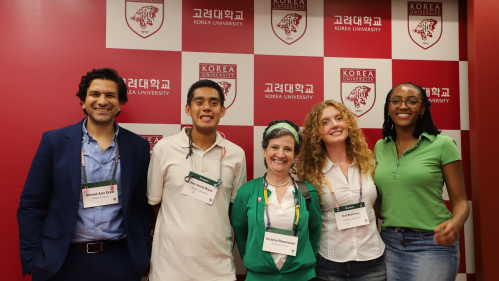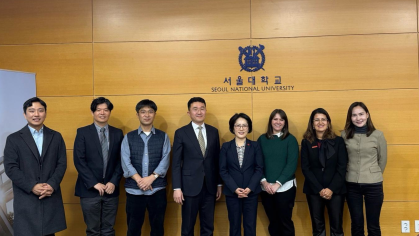Rutgers University was proud to participate in the Climate Corps Summer School 2025 program hosted by Korea University (KU) this summer, bringing together students and scholars from around the world to address the global climate crisis through innovation, education, and partnership.
The Climate Corps Summer School ran from July 6-13 and brought together 130 participants from 35 universities across six continents for the first global climate education program at KU, in partnership with UNDP Seoul Policy Centre.
Over six days, the participants presented and discussed research on food security and climate policy, collaborated across borders to solve global climate challenges, went on field visits to key sustainability sites and initiatives in Seoul, and experienced KU’s zero-waste campus efforts firsthand.
Students had the opportunity to team up with colleagues from around the world to develop new research proposals, entrepreneurial project plans, and policy suggestions, while being mentored by participating faculty members. Faculty members were able to participate in thematic research discussions and explore new collaborative project ideas.
Three students from Rutgers attended the program: Audree Gousse, Eva Brozovsky, and Alex Varela Reyes. In addition, two Rutgers faculty members attended, Ahmed Aziz Ezzat, Assistant Professor of Industrial & Systems Engineering, and Victoria Ramenzoni, Associate Professor in Marine Policy and Social Sciences. Rutgers faculty contributed their expertise by delivering insightful presentations on topics such as household-level adaptation to climate change and reliable operation of renewable energy systems.
Assistant Vice President for Global Affairs Ji-Yeung Jang, who leads Rutgers’ engagement in South Korea, noted: “This international initiative fosters cross-cultural dialogue and equips future leaders with the tools to tackle climate challenges collaboratively. We’re thrilled to see Rutgers students engaging with peers and faculty from Korea University and around the world— exchanging ideas, building networks, and advancing shared sustainability goals.
Professor Ezzat said, “We had very enriching discussions over the course of the program and met many international and Korean colleagues addressing similar energy and climate challenges from different perspectives. We look forward to continuing these discussions and translating the ideas explored with our international colleagues into impactful global research projects.”
Climate Corps Summer School 2025 marked a meaningful step toward global collaboration for climate action and inclusive sustainability leadership all around the world. Jang added, “We are grateful to Korea University for hosting such an impactful program and to the Rutgers Climate and Energy Institute (RCEI) who helped make this exchange possible.”




